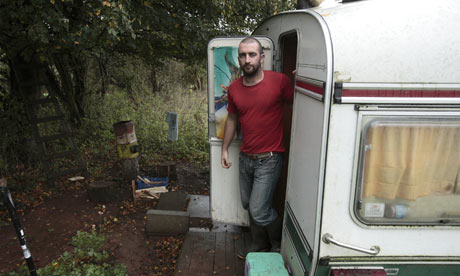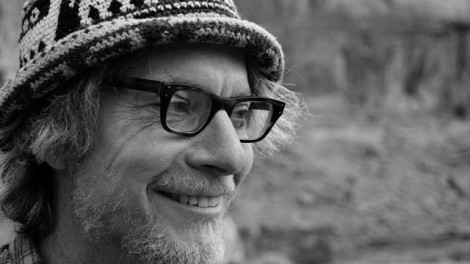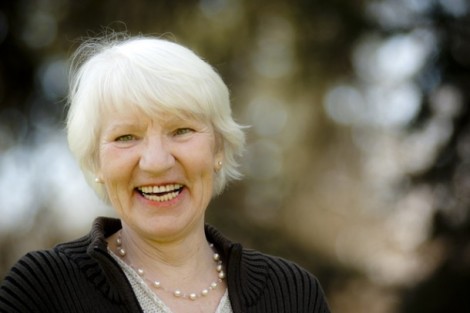Mark Boyle

From an article in the guardian:
“I live without cash – and I manage just fine
Armed with a caravan, solar laptop and toothpaste made from washed-up cuttlefish bones, Mark Boyle gave up using cash.
In six years of studying economics, not once did I hear the word “ecology”. So if it hadn’t have been for the chance purchase of a video called Gandhi in the final term of my degree, I’d probably have ended up earning a fine living in a very respectable job persuading Indian farmers to go GM, or something useful like that. The little chap in the loincloth taught me one huge lesson – to be the change I wanted to see in the world. Trouble was, I had no idea back then what that change was.
After managing a couple of organic food companies made me realise that even “ethical business” would never be quite enough, an afternoon’s philosophising with a mate changed everything. We were looking at the world’s issues – environmental destruction, sweatshops, factory farms, wars over resources – and wondering which of them we should dedicate our lives to. But I realised that I was looking at the world in the same way a western medical practitioner looks at a patient, seeing symptoms and wondering how to firefight them, without any thought for their root cause. So I decided instead to become a social homeopath, a pro-activist, and to investigate the root cause of these symptoms.
One of the critical causes of those symptoms is the fact we no longer have to see the direct repercussions our purchases have on the people, environment and animals they affect. The degrees of separation between the consumer and the consumed have increased so much that we’re completely unaware of the levels of destruction and suffering embodied in the stuff we buy. The tool that has enabled this separation is money.
If we grew our own food, we wouldn’t waste a third of it as we do today. If we made our own tables and chairs, we wouldn’t throw them out the moment we changed the interior decor. If we had to clean our own drinking water, we probably wouldn’t contaminate it.
So to be the change I wanted to see in the world, it unfortunately meant I was going to have to give up cash, which I initially decided to do for a year. I got myself a caravan, parked it up on an organic farm where I was volunteering and kitted it out to be off-grid. Cooking would now be outside – rain or shine – on a rocket stove; mobile and laptop would be run off solar; I’d use wood I either coppiced or scavenged to heat my humble abode, and a compost loo for humanure.
Food was the next essential. There are four legs to the food-for-free table: foraging wild food, growing your own, bartering, and using waste grub, of which there is loads. On my first day, I fed 150 people a three-course meal with waste and foraged food. Most of the year, though, I ate my own crops.
To get around, I had a bike and trailer, and the 34-mile commute to the city doubled up as my gym subscription. For loo roll I’d relieve the local newsagents of its papers (I once wiped my arse with a story about myself); it’s not double-quilted, but I quickly got used to it. For toothpaste I used washed-up cuttlefish bone with wild fennel seeds, an oddity for a vegan.
What have I learned? That friendship, not money, is real security. That most western poverty is of the spiritual kind. That independence is really interdependence. And that if you don’t own a plasma screen TV, people think you’re an extremist.
People often ask me what I miss about my old world of lucre and business. Stress. Traffic jams. Bank statements. Utility bills.
Well, there was the odd pint of organic ale with my mates down the local.
• Mark Boyle is the founder of The Freeconomy Community. In a subsequent blog he responds to the comments below.”
Daniel Suelo

Article from details.com
Daniel Suelo lives in a cave. Unlike the average American—wallowing in credit-card debt, clinging to a mortgage, terrified of the next downsizing at the office—he isn’t worried about the economic crisis. That’s because he figured out that the best way to stay solvent is to never be solvent in the first place. Nine years ago, in the autumn of 2000, Suelo decided to stop using money. He just quit it, like a bad drug habit.
His dwelling, hidden high in a canyon lined with waterfalls, is an hour by foot from the desert town of Moab, Utah, where people who know him are of two minds: He’s either a latter-day prophet or an irredeemable hobo. Suelo’s blog, which he maintains free at the Moab Public Library, suggests that he’s both. “When I lived with money, I was always lacking,” he writes. “Money represents lack. Money represents things in the past (debt) and things in the future (credit), but money never represents what is present.”
On a warm day in early spring, I clamber along a set of red-rock cliffs to the mouth of his cave, where I find a note signed with a smiley face: CHRIS, FEEL FREE TO USE ANYTHING, EAT ANYTHING (NOTHING HERE IS MINE). From the outside, the place looks like a hollowed teardrop, about the size of an Amtrak bathroom, with enough space for a few pots that hang from the ceiling, a stove under a stone eave, big buckets full of beans and rice, a bed of blankets in the dirt, and not much else. Suelo’s been here for three years, and it smells like it.
Night falls, the stars wink, and after an hour, Suelo tramps up the cliff, mimicking a raven’s call—his salutation—a guttural, high-pitched caw. He’s lanky and tan; yesterday he rebuilt the entrance to his cave, hauling huge rocks to make a staircase. His hands are black with dirt, and his hair, which is going gray, looks like a bird’s nest, full of dust and twigs from scrambling in the underbrush on the canyon floor. Grinning, he presents the booty from one of his weekly rituals, scavenging on the streets of Moab: a wool hat and gloves, a winter jacket, and a white nylon belt, still wrapped in plastic, along with Carhartt pants and sandals, which he’s wearing. He’s also scrounged cans of tuna and turkey Spam and a honeycomb candle. All in all, a nice haul from the waste product of America. “You made it,” he says. I hand him a bag of apples and a block of cheese I bought at the supermarket, but the gift suddenly seems meager.
Suelo lights the candle and stokes a fire in the stove, which is an old blackened tin, the kind that Christmas cookies might come in. It’s hooked to a chain of soup cans segmented like a caterpillar and fitted to a hole in the rock. Soon smoke billows into the night and the cave is warm. I think of how John the Baptist survived on honey and locusts in the desert. Suelo, who keeps a copy of the Bible for bedtime reading, is satisfied with a few grasshoppers fried in his skillet.
Read More About Daniel Here
Heidemarie Schwermer

Article from BusinessInsider.com:
In her early 50s, Schwermer decided to see what it’d be like to leave her cushy job as a psychotherapist and live money-free, a journey that’s been documented in the film “Living Without Money.”
Sixteen years later, she hasn’t looked back. Schwermer, now pushing 70, recently took a pause during her stay in Hamelin, Germany to chat with Business Insider about why she decided to leave everything behind.
WWII refugees, Schwermer’s family fled from Prussia to Germany in the 1940s. Her father had owned a successful coffee roastery and kept a nanny and full-time gardener on his payroll. “We were well-off but ended up as riff-raff,” she says. “Then we became rich again and (we) had to defend it. I’ve always had to justify myself, whether we were rich or poor.”
Throughout her life, she became fascinated with finding ways to live without money. A former teacher and psychotherapist, Schwermer formed Germany’s first exchange circle, “Give And Take Central” in 1994. The group helped locals exchange simple services like babysitting or house cleaning for tangible goods. “I noticed that I needed money less and less,” she told Business Insider. “And so I thought, I can try to live one year without money.”
Schwermer attempted to live without money at least four times, she says, but it wasn’t until a friend asked her to house sit for three months that she finally took the plunge. “I said, ‘The time is right. Now I’ll do it.’ I gave everything away.” That included her apartment, which she sold first, and everything that wouldn’t fit into a small suitcase.
What was only meant to last 12 months became her life for the next 16 years. “I only wanted to try to do an experiment and in that year, I noticed a new life,” she said. “I didn’t want to go back to the old life.”
Family and friends weren’t on board when she pitched the idea. She only sees her two children and three grandchildren a few times per year, but says they’ve warmed up to her come-and-go lifestyle. “Now they’re proud of what I’m doing. It’s enough for us,” she says.
After divorcing her first and only husband 40 years ago, Schwermer hasn’t re-married. She’s clearly not in any rush. “If it happens, I’m interested, yes,” she says. “Sometimes it does. Sometimes it doesn’t.”
